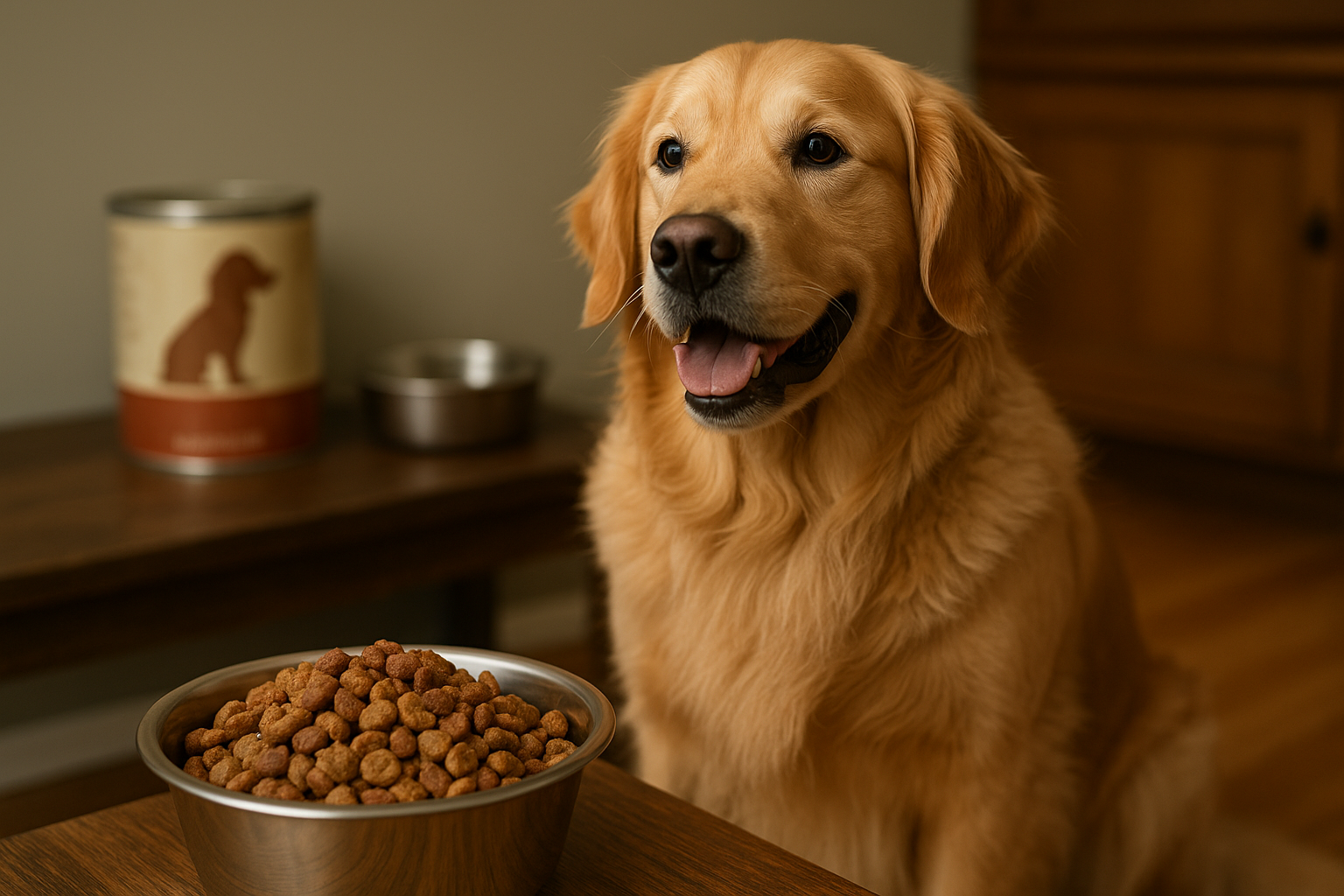Feeding your Golden Retriever the right way is one of the most important responsibilities you have as a dog owner. Goldens are known for their hearty appetites—but not everything that tastes good is good for them. From choosing the right dog food to understanding portion sizes and special dietary needs, this article will guide you through creating a healthy diet plan for your beloved pup.
Why Golden Retrievers Need Special Attention in Their Diet
Golden Retrievers are a large, active breed with specific nutritional requirements. They are prone to certain health issues, including obesity, joint problems, and skin conditions, all of which can be managed—or worsened—through diet.
Common Diet-Related Concerns:
- Weight gain and obesity
- Food allergies and sensitivities
- Joint support needs (like hip dysplasia)
- Digestive issues
By understanding these risks, you can build a diet that supports your Golden’s long-term health.
Key Nutritional Needs for Golden Retrievers
When selecting food, it’s essential to focus on the quality of ingredients and the balance of nutrients. Here’s what to look for:
Core Nutrients:
- Protein: Should be the first ingredient—ideally from real meat like chicken, turkey, or fish. Supports muscle maintenance and energy.
- Fats: Omega-3 and omega-6 fatty acids keep skin and coat healthy. Look for sources like fish oil or flaxseed.
- Carbohydrates: Brown rice, sweet potatoes, and oats are better choices than corn or wheat. They provide sustained energy.
- Fiber: Supports digestion and helps regulate weight.
- Vitamins & Minerals: A balanced blend of vitamins A, E, D, calcium, and phosphorus for bone and immune health.
Avoid dog foods that contain artificial colors, flavors, preservatives, or fillers like corn, soy, or by-products.
Choosing Between Kibble, Wet Food, and Raw Diets
Each type of food has its pros and cons. The best choice depends on your dog’s needs, your budget, and your lifestyle.
Dry Kibble:
- Most common and affordable
- Helps clean teeth as they chew
- Easy to store and serve
Wet Food:
- Higher moisture content—good for hydration
- Tastes better for picky eaters
- Can be more expensive and messier
Raw or Homemade Diet:
- Tailored to your dog’s specific needs
- Needs careful planning to ensure nutritional balance
- Requires storage space and time to prepare
- Consult a vet or pet nutritionist before switching
Some owners choose to mix wet and dry food or add fresh veggies and lean meats to kibble for variety and nutrition.
Feeding Puppies vs. Adult Golden Retrievers
Golden Retrievers grow quickly, and their diet needs change significantly during the first 18 months of life.
Puppies:
- Feed high-quality puppy food for large breeds
- Requires more calories and protein
- 3–4 small meals a day until 6 months, then reduce to 2
Adults:
- Switch to adult formula around 12–18 months
- Maintain a healthy weight with portion control
- Stick to 2 meals per day
Always transition foods slowly—over 7 to 10 days—to avoid digestive upset.
Portion Control and Meal Timing
Golden Retrievers love food and are prone to overeating. Free-feeding (leaving food out all day) is not recommended.
Feeding Guidelines:
- Follow the feeding chart on your dog food packaging
- Adjust portions based on activity level and age
- Use a measuring cup—don’t eyeball it
- Feed at the same time each day for consistency
- Pick up the bowl after 15–20 minutes
Treats should make up no more than 10% of daily caloric intake.
Healthy Treats and Snacks for Golden Retrievers
Not all dog treats are created equal. Many commercial options are full of sugar, fat, and additives. Stick to healthy, natural options when rewarding your pup.
Great Choices:
- Baby carrots
- Apple slices (no seeds)
- Blueberries
- Frozen green beans
- Lean chicken breast (cooked, unseasoned)
- Store-bought treats with minimal ingredients
Avoid chocolate, grapes, onions, garlic, and anything with xylitol—these are toxic to dogs.
Hydration: Don’t Forget the Water
Water is often overlooked, but it’s just as important as food. A Golden Retriever should have access to clean, fresh water 24/7.
Tips to Encourage Hydration:
- Clean the water bowl daily
- Use ceramic or stainless steel bowls
- Add a splash of bone broth or a few ice cubes for appeal
- Increase water after play or hot weather
If your dog doesn’t drink enough, it can lead to kidney or urinary issues over time.
Signs Your Dog’s Diet Might Be Off
Keep an eye out for signals that something’s not right with your Golden’s food.
Warning Signs:
- Lethargy or lack of interest in food
- Vomiting or diarrhea
- Itchy skin or frequent ear infections
- Bad breath or dental issues
- Weight gain or loss
If you notice any of these, talk to your vet and consider changing the diet gradually.
Final Thoughts: Feed for Longevity and Quality of Life
Feeding your Golden Retriever is about more than satisfying hunger—it’s about fueling a long, active, and happy life. Invest in quality food, stick to a consistent schedule, and monitor your dog’s health over time. With the right nutrition, your Golden will be by your side, healthy and full of life, for many joyful years.

